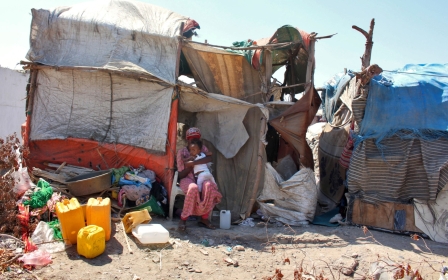Germany ends training of Saudi border forces after alleged atrocities

Germany has ended a training programme for Saudi border forces implicated in the alleged mass killings of migrants at the border with Yemen.
In a statement to the Guardian, the German interior ministry said the programme had been “discontinued” following reports of “massive human rights violations" by Saudi border forces.
The ministry clarified that the removal of the programme was a “precaution" and that no training of Saudi forces had taken place in the border area between the kingdom and Yemen.
The announcement comes amid reports of a surge in “deliberate mass killings” of predominantly Ethiopian migrants attempting to cross the border by Saudi border forces.
Reports of security forces firing on hundreds of migrants first emerged in 2020, but escalated in 2022-23.
New MEE newsletter: Jerusalem Dispatch
Sign up to get the latest insights and analysis on Israel-Palestine, alongside Turkey Unpacked and other MEE newsletters
According to the Guardian, Saudi authorities had legitimised the increasing use of lethal force against migrants by treating incursions along the Yemen-Saudi border as a "counter-terrorism" issue.
A Human Rights Watch (HRW) investigation earlier this month drew renewed international scrutiny; satellite imaging, photographs and witness testimony by survivors revealed what HRW’s lead researcher, Nadia Harman, described as “obscene” levels of violence perpetrated by the border force.
The Saudi authorities have denied all allegations.
The British newspaper recently reported that the US and Germany had been conducting long-term training programmes for Saudi forces commanded by the Ministry of the Interior, including its border force.
German training of Saudi forces started in 2009, and paused only briefly after the 2018 killing of the Washington Post journalist and MEE contributor Jamal Khashoggi in the Saudi consulate in Istanbul.
It is not clear when Germany made the decision to end the programme.
The US training programme for the Saudi border force, known as Ministry of Interior-Military Assistance Group (MOI-MAG), dates back to 2008.
According to the US training agreement, Washington was required to monitor how the training was being used. The agreement also stated that those being trained were only allowed to operate defensively, to protect themselves and their sites from attacks.
The funding for the programme ran out last month, reportedly for reasons unrelated to the alleged atrocities.
Last Thursday, the US State Department publicly acknowledged that it had known about the spike in lethal violence on the border since last summer, contradicting an earlier statement by the agency that the US government had first heard reports of abuses in December 2022.
The State Department also confirmed that the US government had conducted a training programme for Saudi border forces between 2017 and 2022 but it insisted that the training excluded border guards on land, focusing instead on maritime guards.
A US training spokesperson said they were urging Saudi Arabia to conduct a “thorough and transparent investigation”.
The Saudi-Yemen border has become particularly dangerous in recent years, with around 430 deaths and 650 injuries recorded between 1 January and 30 April 2022.
In October, several UN special rapporteurs highlighted the killings in a letter, describing them as "gross human rights violations against migrants".
HRW has called on Saudi Arabia to "immediately and urgently revoke any policy, whether explicit or de facto, to deliberately use lethal force on migrants and asylum seekers, including targeting them with explosive weapons and close-range attacks".
Middle East Eye delivers independent and unrivalled coverage and analysis of the Middle East, North Africa and beyond. To learn more about republishing this content and the associated fees, please fill out this form. More about MEE can be found here.





